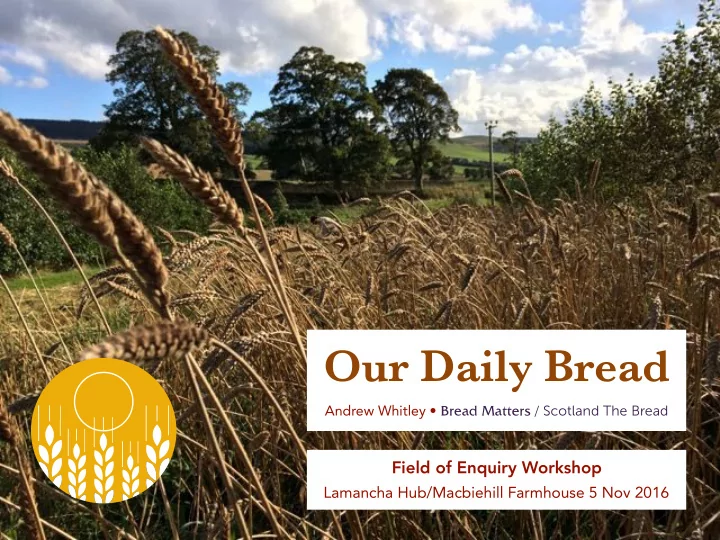

Our Daily Bread Andrew Whitley • Bread Matters / Scotland The Bread Andrew Whitley Bread Matters Field of Enquiry Workshop Lamancha Hub/Macbiehill Farmhouse 5 Nov 2016
Our Daily Bread from the Pharaohs to Fast Food Bread is a good subject for the kind of food policy analysis embraced by the Field of Enquiry project because • it is an archetypal food stuff whose history spans all ‘regimes of accumulation’ • it has formed a major part of people’s diet and is still an important food category • it is a ‘global’ food (though usually made and consumed nationally or locally) whose nature is influenced by climate, trade and political power • it has a cultural significance, born of its pivotal nutritive role, with a socio-political and epidemiological resonance not found to the same extent in foods that are more recent examples of mass consumption
“The bread I eat in London is a deleterious paste, mixed up with chalk, alum and bone-ashes; insipid to the taste and destructive to the constitution. The good people are not ignorant of this adulteration; but they prefer it to wholesome bread, because it is whiter than the meal of corn. Thus they sacrifice their taste and their health, and the lives of their tender infants, to a most absurd gratification of a misjudging eye; and the miller or the baker, is obliged to poison them and their families, in order to live by his profession.” (Tobias Smollett, The Expedition of Humphrey Clinker, 1771)
“Too often the dwelling of the factory family is no home; it is sometimes a cellar, which includes no cookery, no washing, no making, no mending, no decencies of life, no invitations to the fireside.” Factory Commission report of 1833, quoted in Hammond & Hammond (1925), The Town Labourer 1760-1832: The New Civilisation.
1870 – the roller mill (Nutrients per 100 grams ) Stoneground Roller-milled white flour bleached white flour Protein 12.5 g 10.1 g Fat 1.4 g 0.9 g Total mineral 1.1 g 0.4 g Calcium 44.0 mg 20.0 mg Phosphorus 180.0 mg 92.0 mg Iron 3.3 mg 1.0 mg Carotene (pro-vitamin A) 0.2 mg nil Riboflavin (vitamin B 2 ) 0.02 mg 0.01 mg Vitamin B 1 (international units) 100 10-15 'From that time [1870] to the present day a large part of the population of England has been subsisting on diets containing considerably less vitamin B 1 than is physiologically required.’ Drummond & Wilbraham (1939) The Englishman’s Food: A History of Five Centuries of English Diet .
Farming, Nutrition & Digestibility Loss of mineral density in wheat – many older cultivars and landraces have higher concentrations of important minerals (Mg, Fe, Zn etc). Flour fortification (mandatory for all non-wholemeal UK flour since 1953) masks decreasing nutrient density of UK wheat flour. The iron used to fortify UK flour is almost completely non-bioavailable according to Government scientists (SACN – scientific advisory committee on nutrition). Increase of toxic proteins high molecular weight glutenin subunits alpha-, gamma- and omega-5 gliadin epitopes amylase-trypsin inhibitors (ATIs): starch digestion; immune responses Interactions with agronomy
Breadmaking: Fermentation is vital The Chorleywood Bread Process: ‘no time dough’ + additives Time is of the essence, as are lactic acid bacteria Sourdough effects: • protein hydrolysis • reduction of fructans & short-chain fermentable carbohydrates in baked loaves • bioaccessibility of minerals • induction of e.g. cancer-preventative peptide lunasin • low GI
Scotland – anatomy of a failed market > 1 million tonnes – Scottish wheat crop 2015 140,000 tonnes (<14%) – would make all Scotland’s bread ~0 tonnes – Scottish wheat actually used for bread 2 inches – increase in Scottish men’s waistlines in a decade 66% of Scots are overweight or obese £3 billion p.a. – projected cost of obesity to Scotland in 2030 1 in 20 – the number of currently unemployed people in Scotland, retrained as skilled bakers, needed so that everyone in Scotland is within walking distance of fresh, additive-free and preservative-free bread.
www.scotlandthebread.org www.breadmatters.com @scotlandbread @BreadMatters
Recommend
More recommend